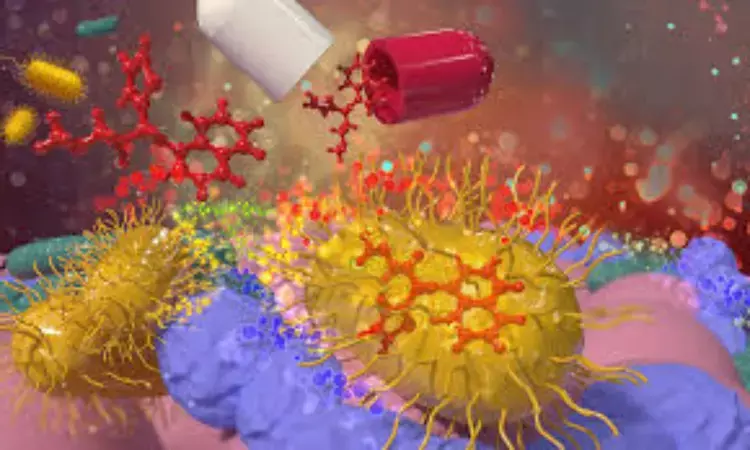- Home
- Medical news & Guidelines
- Anesthesiology
- Cardiology and CTVS
- Critical Care
- Dentistry
- Dermatology
- Diabetes and Endocrinology
- ENT
- Gastroenterology
- Medicine
- Nephrology
- Neurology
- Obstretics-Gynaecology
- Oncology
- Ophthalmology
- Orthopaedics
- Pediatrics-Neonatology
- Psychiatry
- Pulmonology
- Radiology
- Surgery
- Urology
- Laboratory Medicine
- Diet
- Nursing
- Paramedical
- Physiotherapy
- Health news
- Fact Check
- Bone Health Fact Check
- Brain Health Fact Check
- Cancer Related Fact Check
- Child Care Fact Check
- Dental and oral health fact check
- Diabetes and metabolic health fact check
- Diet and Nutrition Fact Check
- Eye and ENT Care Fact Check
- Fitness fact check
- Gut health fact check
- Heart health fact check
- Kidney health fact check
- Medical education fact check
- Men's health fact check
- Respiratory fact check
- Skin and hair care fact check
- Vaccine and Immunization fact check
- Women's health fact check
- AYUSH
- State News
- Andaman and Nicobar Islands
- Andhra Pradesh
- Arunachal Pradesh
- Assam
- Bihar
- Chandigarh
- Chattisgarh
- Dadra and Nagar Haveli
- Daman and Diu
- Delhi
- Goa
- Gujarat
- Haryana
- Himachal Pradesh
- Jammu & Kashmir
- Jharkhand
- Karnataka
- Kerala
- Ladakh
- Lakshadweep
- Madhya Pradesh
- Maharashtra
- Manipur
- Meghalaya
- Mizoram
- Nagaland
- Odisha
- Puducherry
- Punjab
- Rajasthan
- Sikkim
- Tamil Nadu
- Telangana
- Tripura
- Uttar Pradesh
- Uttrakhand
- West Bengal
- Medical Education
- Industry
Gemigliptin-metformin combo leads to better glycemic control without hypoglycemia risk

South Korea: Treatment with gemigliptin-metformin combination therapy led to the higher achievement of the glycemic target without weight gain or hypoglycemia, better than with glimepiride-metformin, a recent study has shown. The improvements might be linked with beneficial changes in gut microbiota.
"In our randomized controlled trial (RCT) of drug-naïve Korean patients with type 2 diabetes, 77% of the patients given the gemigliptin–metformin therapy achieved the target goal of HbA1c ≤ 7.0% (53 mmol/mol)," the researchers wrote in their study published in the journal Nutrients. They explained, "this approach favourably changed the amino acid levels and gut microbiota, indicating potential improvements in anti-inflammatory effects and pancreatic β-cell function."
"Our findings indicate that changes in the gut microbiota are critical for augmenting the efficacy of gemigliptin therapy. This may apply to DPP-4 inhibitors in more general terms."
Changes in humans' gut microbiota can impact the safety and efficacy of medications. Among anti-diabetic drugs, incretin-based therapy such as dipeptidyl peptidase 4 inhibitors (DPPi) might affect the gut microbiome related to glucose metabolism. Soo Lim from Seoul National University College of Medicine in Seongnam, Republic of Korea, and colleagues conducted a randomized, controlled, active-competitor study to compare the effects of gemigliptin–metformin versus glimepiride–metformin combinations as initial therapies on glucose homeostasis and gut microbiota in drug-naive patients with type 2 diabetes.
Alterations in gut microbiota, amino acid blood levels, body composition, and biomarkers linked to glucose regulation were investigated. The study included seventy drug-naïve patients with type 2 diabetes (mean age, 52.2 years) with an HbA1c (glycated hemoglobin) level of ≥7.5%. They were assigned to either combination of glimepiride–metformin or gemigliptin–metformin therapies for 24 weeks.
The study led to the following findings:
- Although both treatments decreased the HbA1c levels significantly, the gemigliptin–metformin group achieved HbA1c ≤ 7.0% without hypoglycemia or weight gain more effectively than the glimepiride–metformin group (59% vs. 24%).
- At the phylum level, the Firmicutes/Bacteroidetes ratio tended to decrease after gemigliptin–metformin therapy, with a significant depletion of taxa belonging to Firmicutes, including Lactobacillus, Ruminococcus torques, and Streptococcus.
- Regardless of the treatment modality, a distinct difference in the overall gut microbiome composition was noted between patients who reached the HbA1c target goal and those who did not.
To conclude, patients with type 2 diabetes treated with gemigliptin–metformin significantly achieved the glycemic target without hypoglycemia or weight gain, better than with glimepiride–metformin; these improvements might be linked with the beneficial changes in gut microbiota.
Reference:
Lim, S.; Sohn, M.; Florez, J.C.; Nauck, M.A.; Ahn, J. Effects of Initial Combinations of Gemigliptin Plus Metformin Compared with Glimepiride Plus Metformin on Gut Microbiota and Glucose Regulation in Obese Patients with Type 2 Diabetes: The INTESTINE Study. Nutrients 2023, 15, 248. https://doi.org/10.3390/nu15010248
Dr Kamal Kant Kohli-MBBS, DTCD- a chest specialist with more than 30 years of practice and a flair for writing clinical articles, Dr Kamal Kant Kohli joined Medical Dialogues as a Chief Editor of Medical News. Besides writing articles, as an editor, he proofreads and verifies all the medical content published on Medical Dialogues including those coming from journals, studies,medical conferences,guidelines etc. Email: drkohli@medicaldialogues.in. Contact no. 011-43720751


